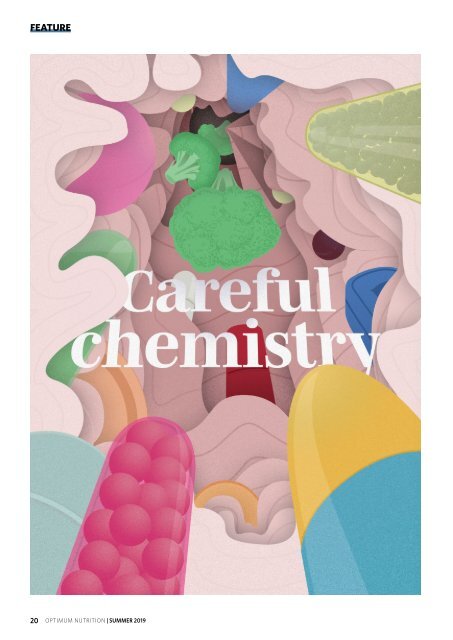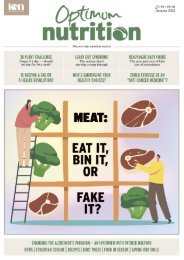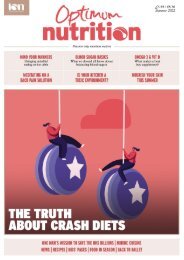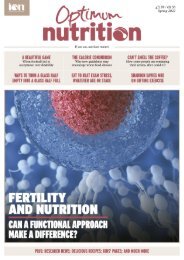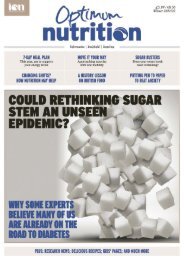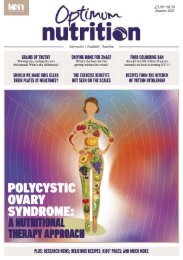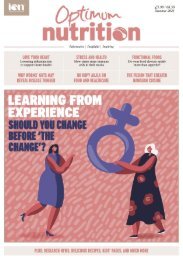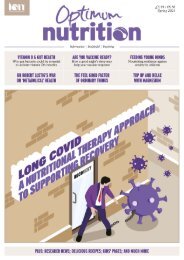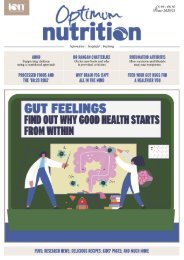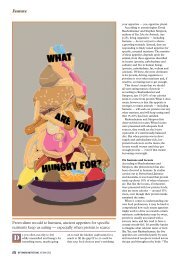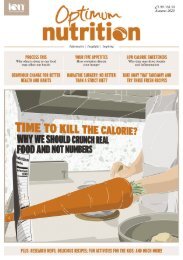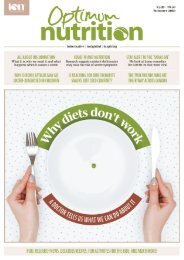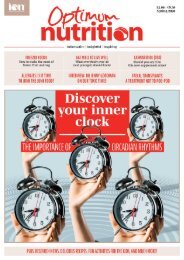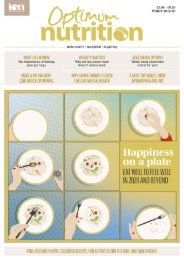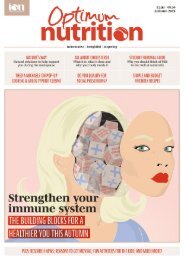Careful chemistry
Some foods can cause problems with prescription and over-the-counter medications. Sally Parr looks at what to watch out for and explains why we should always read the small print
Some foods can cause problems with prescription and over-the-counter medications. Sally Parr looks at what to watch out for and explains why we should always read the small print
Create successful ePaper yourself
Turn your PDF publications into a flip-book with our unique Google optimized e-Paper software.
FEATURE<br />
20 OPTIMUM NUTRITION | SUMMER 2019
FEATURE<br />
Some foods can cause<br />
problems with prescription<br />
and over-the-counter<br />
medications. Sally Parr looks<br />
at what to watch out for<br />
and explains why we should<br />
always read the small print<br />
A<br />
pill for every ill? It certainly<br />
seems that way, with more than<br />
1,100m prescriptions handed<br />
out in England in 2017/18 1 and the<br />
numbers rising year on year. 2 We might<br />
view such figures as progress, because<br />
it implies that conditions are being<br />
more accurately diagnosed and that<br />
appropriate treatments are available; yet<br />
every time we pop a pill, there’s a ‘risk<br />
versus benefit’ to weigh up.<br />
Whilst some drugs do relieve pain,<br />
alleviate unpleasant symptoms or treat<br />
specific conditions, there is also the<br />
potential for negative interactions with<br />
drinks, foods, nutritional supplements,<br />
herbal products or other drugs. 3 It is also<br />
possible that even the bacteria in our gut<br />
can affect medication or supplements.<br />
Recent research from the University<br />
of California San Francisco, USA, for<br />
example, identified how specific bacteria<br />
in the microbiome can interfere with a<br />
drug taken to relieve the symptoms of<br />
Parkinson’s disease. Levodopa (L-dopa)<br />
is taken to deliver dopamine to the brain,<br />
alleviating symptoms of the disease; but<br />
its effectiveness can vary from person to<br />
person. Because previous research had<br />
shown antibiotics to improve patients’<br />
response to L-dopa, it was speculated<br />
that bacteria might have a role in<br />
affecting L-dopa’s efficacy. In this recent<br />
study, scientists discovered that one<br />
strain of bacteria Enterococcus faecalis (E.<br />
faecalis) was responsible for degrading<br />
L-dopa every time. 4<br />
Prediction problems<br />
Drug and nutrient interactions (DNIs)<br />
can also be difficult to predict because<br />
they involve multiple factors. 5 Medication<br />
can affect food intake, perhaps by<br />
suppressing appetite, and can even affect<br />
how nutrients from food are metabolised.<br />
(See Don’t mix and match and Thinking<br />
of supplementing?) Nevertheless, check<br />
with your GP or pharmacist if you are<br />
prescribed a new medicine, so you<br />
know what to avoid, and always read<br />
the information provided with the<br />
medication.<br />
But DNIs aren’t the whole story. It’s<br />
also worth bearing in mind that using<br />
certain medications for an extended<br />
period can also deplete levels of<br />
nutrients in the body. 5,6 This is an area<br />
where the research is described as being<br />
“quite limited”, 5 which is unfortunate<br />
considering how widespread the<br />
prescribing of various medicines is, 2 how<br />
extensive the interaction impact can be 5<br />
and the fact that symptoms caused by<br />
nutrient depletion may also influence<br />
compliance. 7<br />
Oral contraceptives<br />
The idea that over-the-counter<br />
prescriptions could impact nutritional<br />
status is not new. A report published<br />
in The Lancet as far back as 1975 noted<br />
that among oral contraceptive pill (OCP)<br />
users, there were reductions in vitamins<br />
B2, B6, B9, B12 and C, with lowered<br />
levels of B6 thought to be contributing<br />
to depression and sub-optimal glucose<br />
tolerance. 8 Fast forward to 2013 and the<br />
impact of the OCP on users’ nutritional<br />
status was still being highlighted 9 — with<br />
researchers linking the reduction in B6<br />
levels with a potentially increased risk of<br />
blood clots. 10 Another study, published<br />
a year later, found that supplementing<br />
with B6 among nutritionally vulnerable<br />
women meant they were less likely to<br />
report side effects and so would continue<br />
to use this method of contraception. 7<br />
Good food sources of vitamin B6<br />
include turkey, fish, oatmeal, eggs, soya<br />
beans and legumes. (Note that oversupplementation<br />
with vitamin B6 for<br />
extended periods may result in peripheral<br />
neuropathy, a loss of feeling in the arms<br />
and legs, so always seek support from<br />
a nutritional therapist who is registered<br />
with BANT and the CNHC, or from your<br />
GP rather than self-prescribing.<br />
Difficult to diagnose<br />
However, it was only in 2018 that<br />
researchers in the USA finally amassed<br />
and investigated as much of the available<br />
evidence as they could; concluding that<br />
long term use of both prescribed and<br />
over-the-counter drugs could result in<br />
“clinically relevant” nutrient deficiencies. 5<br />
They argued that supplementation<br />
should be recommended if medications<br />
thought to affect nutritional status were<br />
taken, particularly among vulnerable<br />
groups most at risk of deficiency.<br />
But part of the problem lay, the<br />
researchers found, in the fact that<br />
the symptoms of deficiency would<br />
occur over long periods of time,<br />
didn’t tend to present as ‘textbook’<br />
cases, and were most likely to be put<br />
down to the condition or the ageing<br />
process — making them difficult to<br />
diagnose and address effectively with<br />
supplementation. 5<br />
Proton pump inhibitors<br />
Take Proton Pump Inhibitors (PPIs), for<br />
example. Given for gastro-oesophageal<br />
reflux disease (GORD), they are<br />
among the most commonly prescribed<br />
medications in the world. 11 (Also see<br />
p.12 Optimum Nutrition Autumn 2018,<br />
available via www.ion.ac.uk.)<br />
Described in Pharmacy Times last<br />
summer as “nutrient robbers”, 12 in an<br />
article devoted to how to “deprescribe”<br />
them, PPIs are thought to cost the NHS<br />
more than £100m each year, 13 with some<br />
practices prescribing them indefinitely. 11<br />
Interestingly, it’s their propensity to<br />
limit production of gastric acid — the<br />
very thing for which they are prescribed<br />
— that can cause problems in the longer<br />
term. This is because many nutrients<br />
require an acidic environment to ‘unlock’<br />
them, ready for subsequent uptake by<br />
the body, 11 but the PPI, through doing<br />
what it is meant to do, lowers this<br />
ability.<br />
PPI users are also thought to have<br />
a significantly lower abundance<br />
of beneficial bacteria in their gut<br />
microbiome due to alterations in<br />
DON’T MIX AND MATCH...<br />
• Grapefruit juice interferes with liver<br />
enzymes needed to break down<br />
medications before they are eliminated.<br />
This can result in increased levels of the<br />
drug remaining in the body. Cranberry<br />
juice can also be problematic.<br />
• Green leafy veg is rich in vitamin K. It is<br />
important if taking anti-coagulants such<br />
as warfarin to be consistent with intake<br />
and avoid eating large amounts of this<br />
type of veg as it may interfere with<br />
blood clotting in the body.<br />
• Aged cheeses, yeast extract, red wine,<br />
pickled fish and broad beans should be<br />
avoided if taking MAO inhibitors. The<br />
tyramine in the food can react with the<br />
drug to cause a potentially dangerous<br />
increase in blood pressure. This class of<br />
anti-depressant is rarely prescribed now<br />
due to its propensity to interact with<br />
tyramine-rich foods.<br />
• Natural liquorice may cause salt and<br />
fluid retention, and should not be taken<br />
in conjunction with blood pressurelowering<br />
drugs.<br />
• Avoid taking milk with antibiotics<br />
because the medication may prevent<br />
calcium being absorbed.<br />
• Garlic should be avoided if taking fish<br />
oils, vitamin E or other blood thinning<br />
supplements.<br />
SUMMER 2019 | OPTIMUM NUTRITION<br />
21
FEATURE<br />
Always ask your GP or<br />
pharmacist to explain<br />
any potential nutritional<br />
deficiencies that may occur in<br />
the longer term due to taking<br />
certain medicines<br />
stomach pH, often resulting in the<br />
increased likelihood of small intestinal<br />
bacterial overgrowth (SIBO) and<br />
gastrointestinal infections. 11 This can<br />
have a detrimental knock-on effect<br />
— particularly because stomach acid,<br />
which the PPI lowers, is essential for<br />
supporting the body and protecting us<br />
from various pathogens that can cause<br />
infections.<br />
THINKING OF SUPPLEMENTING?<br />
In a small survey of adults aged 65 and<br />
above, researchers at the University of<br />
Hertfordshire, UK, found that just over a<br />
third of 155 respondents (33.6 per cent)<br />
used a combination of herbal medicinal<br />
products and dietary supplements<br />
alongside prescription medication. 3<br />
Others (20 per cent) used only herbal<br />
medicinal products with prescription<br />
drugs. Sixteen participants were found<br />
to be at risk of potential adverse drug<br />
interactions.<br />
Potentially problematic interactions<br />
included use of: evening primrose oil,<br />
St. John’s Wort, ginkgo, omega-3 and<br />
glucosamine, all of which are regularly<br />
purchased over the counter.<br />
Foods such as garlic were also<br />
implicated if combined with aspirin.<br />
Other herbal remedies that affect blood<br />
clotting, such as ginseng, were also<br />
noted to be problematic when taken with<br />
warfarin, with issues including reduced<br />
effectiveness of prescription drugs and<br />
increased bleeding.<br />
Long term PPI users may also be<br />
found to be magnesium (Mg) deficient. 14<br />
Mg is hard to come by anyway because<br />
low levels in soil 15 decrease dietary<br />
uptake, whilst stressful, hectic lifestyles<br />
can lower the body’s stores even further.<br />
Muscle twitches or cramps, low mood<br />
and tiredness may all be signs that you<br />
need to up the amounts of Mg-rich<br />
foods in your diet. But because these<br />
niggles can often be attributed to age,<br />
life stage or general busyness, they can<br />
be difficult to pin down to a specific<br />
nutrient deficiency. 5<br />
Some good sources of Mg include<br />
dark green leafy veg (cooked to reduce<br />
oxalic acid, which is sometimes referred<br />
to as an ‘anti-nutrient’ because it can<br />
interfere with absorption of essential<br />
micronutrients), avocado, brown rice,<br />
black beans, yoghurt, almonds, pumpkin<br />
seeds, kefir and — wait for it — dark<br />
chocolate. Mg is also absorbed through<br />
the skin, making a bath with Epsom<br />
salts a good way to take in this essential<br />
micronutrient.<br />
It is worth noting, however, that<br />
because the symptoms of high levels<br />
of stomach acid can present in the<br />
same way as low levels (digestive<br />
discomfort and malabsorption being<br />
common features of both), PPIs may<br />
be prescribed when increased digestive<br />
support is actually called for.<br />
Malnourishment<br />
It is also worth noting that some<br />
medications may also act as appetite<br />
suppressants, with the result that<br />
nutrients aren’t replenished from<br />
day-to-day eating. This is particularly<br />
of concern, for example, with children<br />
with conditions such as ADHD 6 and<br />
with the elderly who may already have<br />
diminished appetites.<br />
In such situations, it may be worth<br />
considering nutritional supplements,<br />
in addition to looking at diet to provide<br />
nutrients that need topping up. It is,<br />
however, recommended that rather than<br />
self-prescribing, you consult your GP or<br />
work with a nutritional therapist who is<br />
a member of BANT and registered with<br />
the CNHC, and who has been trained to<br />
identify DNIs and potential nutritional<br />
depletions. A registered nutritional<br />
therapist can also work with you to<br />
support your digestive health to help the<br />
body absorb nutrients effectively and<br />
efficiently from your diet. Also speak<br />
to your GP or pharmacist for advice<br />
on interactions between prescribed<br />
medications, food and other drugs.<br />
It is essential that you never stop<br />
taking any prescribed medications<br />
without first discussing the risk versus<br />
benefit with your GP or consultant.<br />
Common meds, common problems<br />
Always ask your GP or pharmacist<br />
to explain any potential nutritional<br />
deficiencies that may occur in the<br />
longer term due to taking certain<br />
medicines, and take time to read any<br />
accompanying information. This applies<br />
to both prescribed and over-the-counter<br />
medications, and can include:<br />
• Statins, which may reduce levels of<br />
CoQ10 (an antioxidant used by cells<br />
to produce energy);<br />
• Diuretics, where mineral depletion<br />
can become a problem; 6<br />
• Painkillers, which may irritate the<br />
gut lining and induce sub-optimal<br />
digestive function; 5<br />
• Weight-loss drugs that prevent<br />
fat from being absorbed, therefore<br />
limiting fat-soluble vitamin<br />
absorption;<br />
• Anti-depressants, which may cause<br />
craving for starchy foods, often<br />
resulting in blood sugar imbalance<br />
and insulin resistance issues; 6<br />
• Antibiotics, which may disrupt the<br />
diversity of the gut microbiome. 5<br />
Some antibiotics may also bind with<br />
calcium, preventing its absorption in<br />
the gastrointestinal tract. 6<br />
References:<br />
1. www.statista.com/statistics/418091/<br />
prescription-items-dispensed-in-england<br />
2. digital.nhs.uk/data-and-information/<br />
publications/statistical/prescriptionsdispensed-in-the-community<br />
3. Agbabiaka T et al (2018). Prevalence of drug–<br />
herb and drug–supplement interactions in<br />
older adults: a cross-sectional survey. Brit J of<br />
Gen Prac, 68(675)e711-e717.<br />
4. science.sciencemag.org/content/364/6445/<br />
eaau6323<br />
5. Mohn E et al (2018). Evidence of drug–nutrient<br />
interactions with chronic use of commonly<br />
prescribed mediacations: an update. Pharm,<br />
10 1:36.<br />
6. nutritionreview.org/2016/12/practical-guide-<br />
avoiding-drug-induced-nutrient-depletion<br />
7. Var C et al (2014). Supplementation with<br />
vitamin B6 reduces side effects in Cambodian<br />
women using oral contraception. Nutr, 6(9)<br />
3353-3362.<br />
8. Wynn V (1975). Vitamins and oral<br />
contraceptive use. The Lancet, 305(7906)561-<br />
564.<br />
9. McArthur J et al (2013). Biological variability<br />
and impact of oral contraceptives on vitamins<br />
B6, B12 and folate status in women of<br />
reproductive age. Nutr, 5(9)3634-3645.<br />
10. universityhealthnews.com/daily/nutrition/<br />
side-effects-of-birth-control-pills-includenutrient-depletion<br />
11. Gracie D & Ford A (2016). The possible risks<br />
of proton pump inhibitors. The Med J of Aus,<br />
205(7)292-293.<br />
12. www.pharmacytimes.com/publications/<br />
issue/2018/july2018/proton-pumpinhibitors-how-to-deprescribe-thesenutrient-robbers-<br />
13. www.pharmaceutical-journal.com/opinion/<br />
insight/time-to-halt-the-overprescribing-ofproton-pump-inhibitors/20201548.article<br />
14. William J & Danziger J (2016). Proton-pump<br />
inhibitor-induced hypomagnesemia: Current<br />
research and proposed mechanisms. World J of<br />
nephrol, 5(2)152-7.<br />
15. Guo W et al (2016). Magnesium deficiency in<br />
plants: An urgent problem. The Crop J, 4(2)83-<br />
91.<br />
22 OPTIMUM NUTRITION | SUMMER 2019
Enjoyed reading this article?<br />
Subscribe and read the full digital magazine for free at ion.ac.uk/digital<br />
www.ion.ac.uk | info@ion.ac.uk | 020 8614 7800 | instituteforoptimumnutrition | @ion_nutrition | @ion_nutrition<br />
Institute for Optimum Nutrition is an independent educational charity. Registered company number 2724405, registered charity number 1013084


